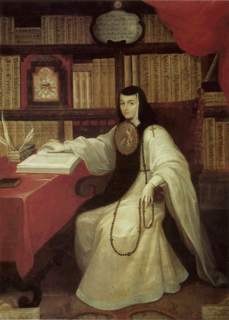A Quote by Louisa May Alcott
[Jo to her mother] I knew there was mischief brewing. I felt it and now it's worse than I imagined. I just wish I could marry Meg myself, and keep her safe in the family.
Related Quotes
I was not yet three years old when my mother determined to send one of my elder sisters to learn to read at a school for girls we call the Amigas. Affection, and mischief, caused me to follow her, and when I observed how she was being taught her lessons I was so inflamed with the desire to know how to read, that deceiving - for so I knew it to be - the mistress, I told her that my mother had meant for me to have lessons too. ... I learned so quickly that before my mother knew of it I could already read.
At a certain point the family moved to Jaipur, where no woman could avoid the doli or purdah. They kept her in the house from morning to night, either cooking or doing nothing. [My mother] hated doing nothing, she hated to cook. So she became pale and ill, and far from being concerned about her health, my grandfather said, 'Who's going to marry her now?' So my grandmother waited for my grandfather to go out, and then she dressed my mother as a man and let her go out riding with her brothers.
When Jo's conservative sister Meg says she must turn up her hair now that she is a "young lady," Jo shouts, "I'm not! and if turning up my hair makes me one, I'll wear it in two tails till I'm twenty.... I hate to think I've got to grow up, and be Miss March, and wear long gowns, and look as prim as a China aster! It's bad enough to be a girl anyway, when I like boys' games and work and manners! I can't get over my disappointment in not being a boy; and it's worse than ever now, for I'm dying to go and fight with Papa, and I can only stay at home and knit, like a poky old woman.
He wanted her. He knew where to find her. He waited. It amused him to wait, because he knew that the waiting was unbearable to her. He knew that his absence bound her to him in a manner more complete and humiliating than his presence could enforce. He was giving her time to attempt an escape, in order to let her know her own helplessness when he chose to see her again.
Jo's face was a study next day, for the secret rather weighed upon her, and she found it hard not to look mysterious and important. Meg observed it, but did not troubled herself to make inquiries, for she had learned that the best way to manage Jo was by the law of contraries, so she felt sure of being told everything if she did not ask.
For more than a year, he'd felt destined to marry Isabel Arundell; now, suddenly, he wasn't so sure. He loved her, that was certain, but he also resented her. He loved her strength and practicality but resented her overbearing personality and tendency to do things on his behalf without consulting him first; loved that she tolerated his interest in all things exotic and erotic but hated her blinkered Catholicism. Charles Darwin had killed God but she and her family, like so many others, still clung to the delusion.
The adolescent does not develop her identity and individuality by moving outside her family. She is not triggered by some magic unconscious dynamic whereby she rejects her family in favour of her peers or of a larger society.... She continues to develop in relation to her parents. Her mother continues to have more influence over her than either her father or her friends.
"She (Minnie Ruth Solomon) was unusual because even though I knew her family was as poor as ours, nothing she said or did seemed touched by that. Or by prejudice. Or by anything the world said or did. It was as if she had something inside her that somehow made all that not count. I fell in love with her some the first time we ever talked, and a little bit more every time after that until I thought I couldn't love her more than I did. And when I felt that way, I asked her to marry me . . . and she said she would."
Christmas won't be Christmas without any presents," grumbled Jo, lying on the rug. "It's so dreadful to be poor!" sighed Meg, looking down at her old dress. "I don't think it's fair for some girls to have plenty of pretty things, and other girls nothing at all," added little Amy, with an injured sniff. "We've got Father and Mother, and each other," said Beth contentedly from her corner.
He looked at her as a man looks at a faded flower he has gathered, with difficulty recognizing in it the beauty for which he picked and ruined it. And in spite of this he felt that then, when his love was stronger, he could, if he had greatly wished it, have torn that love out of his heart; but now when as at that moment it seemed to him he felt no love for her, he knew that what bound him to her could not be broken.



































